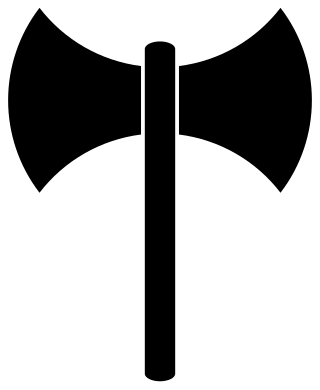Radical feminism is a perspective within feminism that calls for a radical re-ordering of society in which male supremacy is eliminated in all social and economic contexts, while recognizing that women's experiences are also affected by other social divisions such as in race, class, and sexual orientation. The ideology and movement emerged in the 1960s.

Lesbian feminism is a cultural movement and critical perspective that encourages women to focus their efforts, attentions, relationships, and activities towards their fellow women rather than men, and often advocates lesbianism as the logical result of feminism. Lesbian feminism was most influential in the 1970s and early 1980s, primarily in North America and Western Europe, but began in the late 1960s and arose out of dissatisfaction with the New Left, the Campaign for Homosexual Equality, sexism within the gay liberation movement, and homophobia within popular women's movements at the time. Many of the supporters of Lesbianism were actually women involved in gay liberation who were tired of the sexism and centering of gay men within the community and lesbian women in the mainstream women's movement who were tired of the homophobia involved in it.

Transfeminism, also written trans feminism is a branch of feminism focused on transgender women and informed by transgender studies.
Cultural feminism, the view that there is a "female nature" or "female essence", attempts to revalue and redefine attributes ascribed to femaleness. It is also used to describe theories that commend innate differences between women and men. Cultural feminism diverged from radical feminism, when some radical feminists rejected the previous feminist and patriarchal notion that feminine traits are undesirable and returned to an essentialist view of gender differences in which they regard female traits as superior.
Feminist separatism is the theory that feminist opposition to patriarchy can be achieved through women's separation from men. Much of the theorizing is based in lesbian feminism.

Barbara Smith is an American lesbian feminist and socialist who has played a significant role in Black feminism in the United States. Since the early 1970s, she has been active as a scholar, activist, critic, lecturer, author, and publisher of Black feminist thought. She has also taught at numerous colleges and universities for 25 years. Smith's essays, reviews, articles, short stories and literary criticism have appeared in a range of publications, including The New York Times Book Review, The Black Scholar, Ms., Gay Community News, The Guardian, The Village Voice, Conditions and The Nation. She has a twin sister, Beverly Smith, who is also a lesbian feminist activist and writer.

Jill Johnston was a British-born American feminist author and cultural critic who wrote Lesbian Nation in 1973 and was a longtime writer for The Village Voice. She was also a leader of the lesbian separatist movement of the 1970s. Johnston also wrote under the pen name F. J. Crowe.
Redstockings, also known as Redstockings of the Women's Liberation Movement, is a radical feminist nonprofit that was founded in January 1969 in New York City, whose goal is "To Defend and Advance the Women's Liberation Agenda". The group's name is derived from bluestocking, a term used to disparage feminist intellectuals of earlier centuries, and red, for its association with the revolutionary left.

The Furies Collective was a short-lived commune of twelve young lesbian separatists in Washington, D.C., in 1971 and 1972. They viewed lesbianism as more political than sexual, and declared heterosexual women to be an obstacle to the world revolution they sought. Their theories are still acknowledged among feminist groups.

Sally Miller Gearhart was an American teacher, feminist, science-fiction writer, and political activist. In 1973, she became the first open lesbian to obtain a tenure-track faculty position when she was hired by San Francisco State University, where she helped establish one of the first women and gender study programs in the country. She later became a nationally known gay rights activist.
Radical lesbianism is a lesbian movement that challenges the status quo of heterosexuality and mainstream feminism. It arose in part because mainstream feminism did not actively include or fight for lesbian rights. The movement was started by lesbian feminist groups in the United States in the 1950s and 1960s. A Canadian movement followed in the 1970s, which added momentum. As it continued to gain popularity, radical lesbianism spread throughout Canada, the United States, and France. The French-based movement, Front des Lesbiennes Radicales, or FLR, organized in 1981 under the name Front des Lesbiennes Radicales. Other movements, such as Radicalesbians, have also stemmed off of the larger radical lesbianism movement. In addition to being associated with social movements, radical lesbianism also offers its own ideology, similar to how feminism functions in both capacities.
The first annual Bi-National Lesbian Conference happened in Toronto in May 1979.
The Lesbian Organization of Toronto was a lesbian organization founded in 1976 and disbanded in 1980. The group was Toronto's first openly lesbian feminist group, and its members elected to open Canada's first Lesbian Centre.

Andrea Rita Dworkin was an American radical feminist writer and activist best known for her analysis of pornography. Her feminist writings, beginning in 1974, span 30 years. They are found in a dozen solo works: nine books of non-fiction, two novels, and a collection of short stories. Another three volumes were co-written or co-edited with US Constitutional law professor and feminist activist, Catharine A. MacKinnon.
Susan G. Cole is a Canadian feminist author, activist, editor, speaker and playwright. She has spoken out on a number of issues, including free speech, pornography, race and religion. As a lesbian activist and mother, she speaks out on sexuality and family issues and is a columnist.
Feminist views on sexuality widely vary. Many feminists, particularly radical feminists, are highly critical of what they see as sexual objectification and sexual exploitation in the media and society. Radical feminists are often opposed to the sex industry, including opposition to prostitution and pornography. Other feminists define themselves as sex-positive feminists and believe that a wide variety of expressions of female sexuality can be empowering to women when they are freely chosen. Some feminists support efforts to reform the sex industry to become less sexist, such as the feminist pornography movement.
Womyn's land is an intentional community organised by lesbian separatists to establish counter-cultural, women-centred space, without the presence of men. These lands were the result of a social movement of the same name that developed in the 1970s in the United States, Australia, New Zealand, and western Europe. Many still exist today. Womyn's land-based communities and residents are loosely networked through social media; print publications such as newsletters; Maize: A Lesbian Country Magazine; Lesbian Natural Resources, a not-for-profit organisation that offers grants and resources; and regional and local gatherings.

The Women's liberation movement in North America was part of the feminist movement in the late 1960s and through the 1980s. Derived from the civil rights movement, student movement and anti-war movements, the Women's Liberation Movement took rhetoric from the civil rights idea of liberating victims of discrimination from oppression. They were not interested in reforming existing social structures, but instead were focused on changing the perceptions of women's place in society and the family and women's autonomy. Rejecting hierarchical structure, most groups which formed operated as collectives where all women could participate equally. Typically, groups associated with the Women's Liberation Movement held consciousness-raising meetings where women could voice their concerns and experiences, learning to politicize their issues. To members of the WLM rejecting sexism was the most important objective in eliminating women's status as second-class citizens.
Lesbian Nation was a Dutch lesbian feminist activist group, operating from 1976 until the mid 80s. The group was instrumental in the establishment of various cultural institutions in the Netherlands.








